
BMJ Paediatrics Open
Scope & Guideline
Advancing pediatric health through open access research.
Introduction
Aims and Scopes
- Child Health and Development:
Research focusing on various aspects of child health, including developmental milestones, growth patterns, and health outcomes related to pediatric conditions. - Neonatology and Prematurity:
Studies that explore the care, treatment, and outcomes of neonates, particularly those born preterm or with complications. - Infectious Diseases in Pediatrics:
Research that examines the prevalence, management, and outcomes of infectious diseases affecting children, including the impacts of vaccination and emerging infections. - Mental Health in Children and Adolescents:
Investigations into the mental health challenges faced by children and adolescents, including the effects of social determinants and interventions. - Public Health and Health Policy:
Papers addressing public health issues, healthcare access, and policies affecting pediatric populations globally. - Family and Community Health:
Research that emphasizes family-centered care, community health initiatives, and the social determinants of health affecting children. - Nutrition and Feeding Practices:
Studies on the nutritional needs of children, breastfeeding practices, and the implications of dietary interventions on child health. - Quality Improvement in Pediatric Care:
Research focused on improving the quality of care in pediatric settings through innovative practices and interventions.
Trending and Emerging
- Impact of COVID-19 on Pediatric Health:
Research examining the multifaceted impact of the COVID-19 pandemic on children's physical and mental health, including long-term effects and recovery challenges. - Mental Health and Well-being:
There is a growing emphasis on mental health in children and adolescents, exploring issues such as anxiety, depression, and the psychological impact of social changes. - Social Determinants of Health:
Increasing attention is being paid to how social determinants, such as socioeconomic status, environment, and access to healthcare, influence child health outcomes. - Digital Health Interventions:
Emerging research on the use of digital technologies and telemedicine in pediatric care, particularly in response to the challenges posed by the pandemic. - Nutrition and Chronic Disease Prevention:
A trend towards integrating nutrition research with chronic disease prevention strategies, focusing on interventions that support healthy growth and development. - Child Rights and Advocacy:
Growing interest in the rights of children, especially in vulnerable populations, highlighting the need for advocacy and policy changes to support their health. - Integrated Care Models:
Research focused on integrated care approaches that address the complex needs of children with chronic health issues, incorporating multidisciplinary teams.
Declining or Waning
- Traditional Pharmacological Interventions:
There has been a noticeable decline in research focusing solely on traditional pharmacological treatments for pediatric conditions, as the field shifts towards more holistic and integrative approaches. - Single-Cause Studies:
Research that investigates isolated conditions without considering broader systemic or social determinants of health is becoming less common, as a more integrated approach to child health is favored. - Invasive Procedures and Surgical Interventions:
As non-invasive and less intrusive methods gain traction, studies focusing exclusively on invasive procedures for pediatric care are diminishing. - Childhood Obesity as a Standalone Topic:
While still important, the discussions around childhood obesity are increasingly being integrated with broader themes of nutrition, mental health, and social determinants, leading to fewer standalone studies. - Acute Care Models:
There is a waning focus on traditional acute care models in favor of comprehensive, continuous care approaches that address chronic conditions and preventive health.
Similar Journals
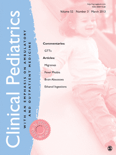
CLINICAL PEDIATRICS
Empowering professionals with vital pediatric knowledge.CLINICAL PEDIATRICS, published by SAGE Publications Inc, is a pivotal journal in the field of pediatrics, focusing on the latest research and clinical practices that impact child health and development. With an ISSN of 0009-9228 and an E-ISSN of 1938-2707, this journal is renowned for its comprehensive coverage of significant topics ranging from perinatology to various pediatric specialties. As a testament to its scholarly influence, CLINICAL PEDIATRICS holds a Q2 ranking in the 2023 Pediatrics, Perinatology and Child Health category on Scopus, showcasing its dedication to advancing pediatric care through evidence-based research. The journal is particularly esteemed for providing a platform that connects researchers, practitioners, and educators, facilitating the dissemination of vital knowledge to enhance children's health outcomes. Although it is not an open-access journal, the insights and findings within its pages prove invaluable for professionals aiming to stay at the forefront of pediatric advancements. With its rich history dating back to 1962 and its commitment to scholarly excellence, CLINICAL PEDIATRICS is an essential resource for anyone invested in the health and well-being of children.

MONATSSCHRIFT KINDERHEILKUNDE
Exploring the forefront of child health and surgical practices.MONATSSCHRIFT KINDERHEILKUNDE is a pivotal German journal dedicated to the fields of pediatrics, perinatology, and child health, published by Springer. With a longstanding history since its inception in 1952, this journal serves as a critical platform for disseminating cutting-edge research and advances in the study of child health and surgical practices affecting the pediatric population. As reflected in its 2023 Scopus rankings, the journal is positioned in the fourth quartile in both Pediatrics and Surgery categories, demonstrating a vital yet niche role within the scientific community. While it currently does not offer Open Access options, MONATSSCHRIFT KINDERHEILKUNDE remains an essential resource for researchers, professionals, and students looking to deepen their understanding of pediatric health issues. Its commitment to contributing to the field through peer-reviewed articles ensures that it continues to facilitate important discussions and developments until at least 2024.

Pediatric Health Medicine and Therapeutics
Transforming pediatric medicine for a healthier future.Pediatric Health Medicine and Therapeutics is a leading open-access journal published by DOVE MEDICAL PRESS LTD that has been dedicated to advancing knowledge in the field of pediatric medicine since 2010. With a focus on innovative practices, research, and therapeutic approaches in child health, this journal serves as a critical resource for researchers, healthcare professionals, and students aiming to improve patient outcomes. Although specific ranking metrics such as HIndex and Scopus rank are currently not available, the journal's commitment to accessibility through open publication ensures a broad dissemination of vital information. The journal is based in the heart of New Zealand and aims to bridge gaps in current literature by publishing high-quality original research, case studies, and reviews that empower practitioners and inspire further study in pediatric health. By promoting impactful research and facilitating international collaboration, Pediatric Health Medicine and Therapeutics plays a significant role in shaping the future of pediatric healthcare.
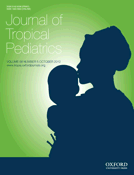
JOURNAL OF TROPICAL PEDIATRICS
Uniting experts to tackle child health challenges globally.JOURNAL OF TROPICAL PEDIATRICS, published by Oxford University Press, stands as a critical platform for the dissemination of research and clinical advancements in the field of tropical pediatrics. With a rich history dating back to 1955, this journal serves as a significant contributor to our understanding of health issues affecting children in tropical and subtropical regions, focusing on infectious diseases, pediatric care, and child health. It currently holds an impressive Q2 ranking in three categories: Infectious Diseases, Medicine (miscellaneous), and Pediatrics, Perinatology and Child Health, placing it among the top journals in its field. Featuring both formative research and applied studies, the journal aims to address the unique challenges posed by pediatric care in tropical environments. Its inclusion in an esteemed database ensures a broad dissemination of critical knowledge to researchers, healthcare professionals, and students alike, promoting a collaborative approach to improving child health outcomes globally.

PEDIATRICS
Shaping the future of pediatrics with impactful insights.PEDIATRICS, published by the American Academy of Pediatrics, stands as a leading journal in the field of pediatrics, perinatology, and child health, with a remarkable impact factor reflecting its significant contributions to the healthcare community. Since its inception in 1948, PEDIATRICS has been dedicated to advancing pediatric knowledge and practice, disseminating high-quality research that shapes policies and improves child health outcomes. With an impressive ranking of #5 out of 330 in its category and occupying the 98th percentile, this journal is essential reading for researchers, clinicians, and students alike, fostering a comprehensive understanding of child health challenges and innovations. Although it does not operate under an open-access model, its rigorous peer-review process ensures that each publication meets the highest standards of scientific excellence. For those passionate about improving pediatric care and advancing research, PEDIATRICS remains a cornerstone resource that continues to influence pediatric practice and policy worldwide.

ARCHIVES OF DISEASE IN CHILDHOOD
Leading the Charge in Pediatric Research ExcellenceArchives of Disease in Childhood is a premier, peer-reviewed journal published by the BMJ Publishing Group, dedicated to advancing the field of Pediatrics, Perinatology, and Child Health. With a rich history dating back to 1930, this journal has become an essential resource for clinicians, researchers, and policy-makers, providing critical insights and evidence-based information that shape pediatric care. With an impressive ranking of #49 out of 330 in its category on Scopus and positioned in the top 15th percentile, the journal consistently features high-impact studies, comprehensive reviews, and innovative research contributions aimed at improving child health outcomes. Although it does not currently offer Open Access options, its rigorous selection process ensures that every article meets the highest standards of scientific quality. Researchers, health professionals, and students alike rely on the Archives of Disease in Childhood to stay at the forefront of pediatric research, making it an indispensable tool for enhancing child health and wellbeing.

Turkish Archives of Pediatrics
Elevating Pediatric Science, One Study at a Time.Turkish Archives of Pediatrics is a prominent Open Access journal dedicated to advancing the field of pediatrics, published by AVES. Launched in 2019, the journal provides an essential platform for researchers, clinicians, and students to disseminate innovative research findings, reviews, and clinical studies focused on child health. Operating out of Turkey, this journal has carved out a notable position in the academic landscape, currently holding a Q3 quartile ranking in Pediatrics, Perinatology, and Child Health as of 2023. With a Scopus rank of #179 out of 330 in its category, the journal ensures significant visibility for its authors, contributing to a wider understanding of pediatric health issues. Its open access policy promotes unrestricted dissemination of vital pediatric research, making it accessible to a global audience and enhancing collaborative efforts across borders. Researchers and professionals looking to stay at the forefront of pediatric advances will find Turkish Archives of Pediatrics to be an invaluable resource.
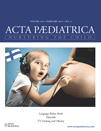
ACTA PAEDIATRICA
Empowering Healthcare Through Cutting-Edge ResearchACTA PAEDIATRICA is a prestigious journal in the field of pediatrics, published by Wiley. With its ISSN 0803-5253 and E-ISSN 1651-2227, this journal has been a vital resource for researchers, healthcare professionals, and students since its inception in 1921, aiming to disseminate high-quality research and advancements in child health and development. Recognized for its impact, ACTA PAEDIATRICA boasts an impressive Q1 ranking in Pediatrics, Perinatology and Child Health and Q2 in Medicine (miscellaneous) for 2023, positioning it within the top-tier of medical journals, as evidenced by its Scopus ranking of #35/330 within its category. The journal covers a wide array of topics relevant to pediatric medicine, thus serving as an essential platform for innovative research and practice. Although it does not offer Open Access options, the journal continues to uphold a commitment to enhancing pediatric knowledge and influencing clinical outcomes. Aimed at contributing significantly to the field, ACTA PAEDIATRICA encourages submissions that enhance our understanding of child health, from basic science to clinical applications.
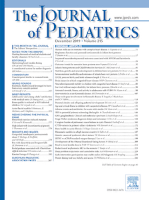
JOURNAL OF PEDIATRICS
Shaping the future of child health with innovative insights.JOURNAL OF PEDIATRICS, published by MOSBY-ELSEVIER, is a premier academic journal dedicated to advancing the field of pediatric medicine. With an impressive HIndex and a prestigious Q1 categorization in Pediatrics, Perinatology and Child Health, this journal stands as a vital resource for researchers, clinicians, and students seeking to stay at the forefront of breakthroughs in child health from 1932 to the present. The journal holds an esteemed position within the Scopus rankings, currently listed at Rank #46 out of 330 in its category, placing it in the 86th percentile. Although it does not offer open access, the journal provides invaluable insights and research findings that shape clinical practices and influence policy decisions in pediatric healthcare. With an unwavering commitment to excellence, the JOURNAL OF PEDIATRICS remains essential for those involved in the care and study of children, ensuring that the voices of leading experts are heard and disseminated within the global medical community.
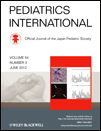
PEDIATRICS INTERNATIONAL
Fostering collaboration for a brighter tomorrow in child health.Pediatrics International, published by Wiley, is a distinguished journal focusing on the fields of Pediatrics, Perinatology, and Child Health. With an ISSN of 1328-8067 and an E-ISSN of 1442-200X, it has made significant contributions to the understanding of pediatric health since its inception, maintaining a longstanding commitment to high-quality research from 1958 through to the present day. The journal falls within the Q3 category of the ranking system for its field and currently holds a Scopus rank of #184 out of 330, placing it in the 44th percentile of pediatric literature, thereby underlining its relevance in contemporary pediatric research. It aims to disseminate critical insights on child health, promote evidence-based practices, and foster collaborations among healthcare professionals. Researchers and practitioners in the field are encouraged to explore the wealth of resources available through open access options for enhanced reach and impact.